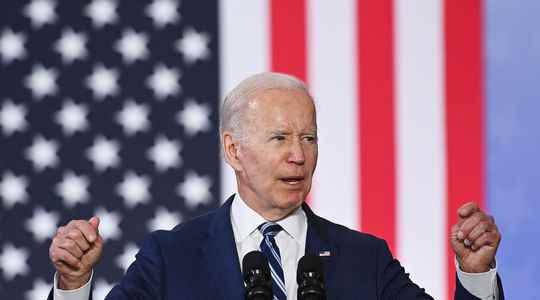The war in Ukraine confronts the Old Continent with a reality: its dependence on its Russian neighbor cannot last. Since President Vladimir Putin’s offensive, Europeans have been thinking about alternatives in order to diversify their purchases. One country could do well in this crisis: the United States. “This is a strategic opportunity, there is nothing to condemn”, immediately declares to L’Express, Cyrille Bret, geopolitician, researcher at the Jacques Delors Institute and teacher at Sciences Po. The first a world power could therefore grab several European markets, whether in the energy, food or armaments sector.
First of all energy: in 2021, Russian gas represented 45% of European imports, according to the European Commission. On this aspect, dependence on Russian energies is declining a little in Europe. Indeed, gas deliveries from the Kremlin collapsed by almost 30% in Europe in the first quarter, announced Sunday, May 1 the group controlled by the Russian state, Gazprom.
In order to respond to the future lack of twenty-seven, the Europeans are turning to their historical allies. On March 25, 2022, the European Commission undertakes to buy from American President Joe Biden 15 billion m3 (Gm3) of additional liquefied natural gas (LNG) in 2022. “The Americans are seizing a geo-economic opportunity to offer Europeans a source of supply that will reduce the share of Russian supplies. In other words, they are reorganizing Europe’s energy geo-economy for the benefit of their own companies”, observes Cyrille Bret. Realizing this, Washington blew up the Moscow’s last lever of international power.
“The Americans will capture the rent from Russia”
In other words, the war in Ukraine represents an opportunity to seize market share from the heavyweight of gas supply in Europe. “This is an extremely important market because the United States will capture the rent from Russia.” If the country of Uncle Sam only accounts for 6.3% of total European gas imports in the first half of 2021, it is already the largest supplier of liquefied natural gas to the European Union.
But could the Americans rise to the rank of the largest gas exporters in Europe? Cyrille Bret replies: “We are not yet at this stage, because it requires a lot of investment that the Europeans will have to make concerning the purchase, construction and development of the commissioning of liquefaction terminals for gas.” According to the specialist, it will take between “one and three years” for the United States to become a major exporter in Europe. But gas is not the only market on which our ally on the other side of the Atlantic would become a considerable partner of Europe.
Russia and Ukraine respectively occupy the first and fifth place in the export of wheat. Between them, they supplied 26% of world demand before the conflict, reports the United Nations Conference on Trade and Development (UNCTAD). However, the war in Ukraine and the sanctions imposed on Russia are impacting the distribution channels.
On the world markets, wheat, corn and even sunflower oil have become rarer, leading to a rise in prices: a tonne of wheat went from 200 euros in April 2021 to 400 euros in April 2022. “At 3 April 2022, 404,162 tons entered the EU from the Russian Federation, which corresponds to 20.9% of European wheat imports. Ukraine comes second with 328,581 tons, or 17% of the total”, indicates the site All of Europe, taking up the cereals statistics proposed by the EU executive.
The United States, breadbasket of the planet?
Can American farmers substitute for Russians and Ukrainians? “The United States has huge areas and very high production, they have the ability to replace Ukraine, in terms of volume and production capacity,” says Anne-Sophie Alsif to L’Express. , chief economist for the consulting firm BDO France. It should be noted that the United States already traditionally occupies an extremely strong position in cereal exports. “They saved several European countries from starvation,” comments Cyrille Bret.
Importing US grain, however, would have a price. “With transport, the overall costs will be higher and this would not be very interesting in the short term for Europeans in an inflationary context (…) To this can also be added the problem of standards on market penetration European, in particular because of the use of GMOs (genetically modified organism)”, explains Anne-Sophie Alsif.
In addition, the Americans distinguish themselves through another area: armaments. On a global scale, the United States is the first arms exporter and the war in Ukraine could benefit the local military industry. “With the conflict, we will witness a remilitarization of European countries”, assures Anne-Sophie Alsif. At the end of February, the German leader Olaf Scholz decided to release 100 billion euros to modernize his army. Unsurprisingly, Berlin is knocking on the door of major American groups to meet its demand. Officially, the American offer corresponded more to their needs, but Anne-Sophie Alsif perceives diplomatic issues there: “It’s also a way of maintaining their good relations with the Americans, but we would have preferred that the Germans buy in Europe.”
I
While the United States is engulfed in these economic breaches, the Americans seem to be taking advantage of it to put their pawns back on the continent, argues Anne-Sophie Alsif: “With the war in Ukraine, the White House does not want to see Europe pass under the Russian yoke (…), there is the idea of using the Europeans to reassert their power.” This bifurcation to the west thus marks the return of the United States to Europe. However, according to Cyrille Bret, “this remains quite negative for European geostrategic autonomy”.
I
